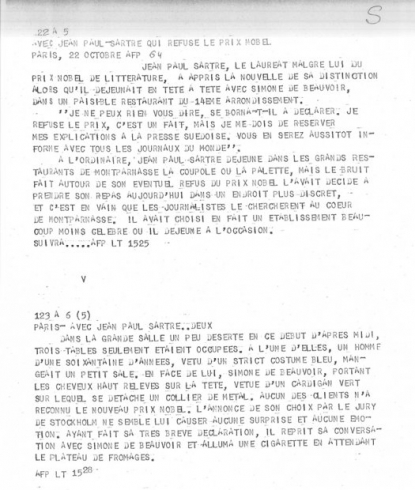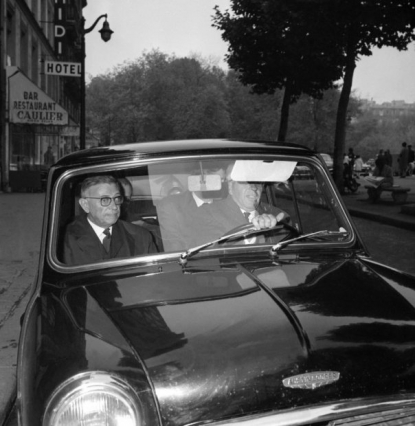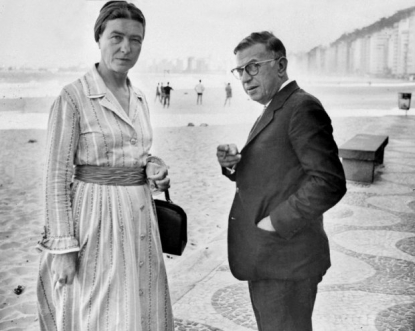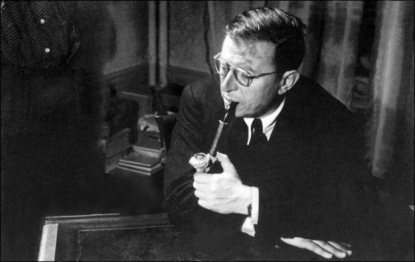Sartre 1964 : A long forgotten scoop
STOCKHOLM, October 6, 2014 - My relationship with Jean-Paul Sartre is "complicated". As a teenager, I plucked his play "Dirty Hands" from my parents' bookshelf, intrigued by the title. But I was too young to too understand it, and quickly gave up. In my 20s, when reading his novel "Nausea", I found myself identifying with its chief protagonist Antoine Roquentin, who finds himself listless in the fictitious town of Bouville, just as I did in as a student and intern in another dismal spot in Normandy. But my experience was really not worth sharing, hence my difficulty grasping the point of Roquentin's story. A few years later, I admired the style of the autobiographical "The Words", but had a hard time finishing it.
September 13, 2014. I'm in AFP's Stockholm bureau. The Nobel’s official Twitter account catches my attention: the existentialist philosopher’s famous “non” to the literature prize. This is story material! Undoubtedly! Not only is this incident one of the best-known in Nobel history. I also have a feeling I can't be the only one who never understood the move.
50 years ago, 1964 Literature Laureate Jean-Paul Sartre did not accept the #NobelPrize. More on Sartre’s refusal: http://t.co/ffm7ESVRD9
— The Nobel Prize (@NobelPrize) September 13, 2014
First question to ask yourself when writing about a 50-year-old event: what happened exactly? In this particular case, when and how did Sartre learn he had won the Nobel? When and how did he say he was turning it down?

The answer proves hard to track down. In everything I read online, this part of the story is omitted. I quickly learn that Sartre had made his decision before the announcement. He had even written to the Swedish academy, hoping he would not be selected. On the other hand, I find nothing on the exact sequence of events on October 22 that year.
After tedious research, I stumble upon an extract from a book called "Le Monde était à nous" (The World Was Ours), which has the full story. It turns out that AFP got the scoop – thanks to Francois de Closets, the book's author who started out as an agency writer before going on to become a well-known French media personality. I didn't even know he had worked with us.
AFP has a well-known list of landmark scoops. Stalin's death, the Israeli hostages killed during the Munich Olympics and Ben Johnson's doping in Seoul are the best known. Sartre? Never heard of that one. When I contact Francois de Closets, he’s not surprised.

AFP's scoop: Sartre refuses the Nobel, then lights up a cigar and orders a cheese plateau
Question: How did you end up speaking to Sartre on that day?
Francois de Closets: "It's an interesting story I wrote in a book. That day around noon we learnt that Sartre had won the Nobel. Almost everyone was out for lunch. The editor-in-chief, visibly excited, came to me and asked: “How about you, do you know where Sartre can be found?” I said he always had lunch in Montparnasse. He told me to go, so I dashed to the restaurant La Coupole on my scooter. No Sartre there. Against a small amount of money, a waiter told me to go to the other side of the boulevard, to Le Select. No Sartre either. Someone whispers that sometimes he goes to L'Oriental on Denfert-Rochereau square. There were three tables with guests, and there he was, sitting in front of Simone de Beauvoir. He was eating sausages with lentils. Out of decency, I let him finish his plate. I approached them and introduced myself: “Good afternoon, I'm Francois de Closets, a reporter at AFP.” I broke the news that he was a Nobel laureate. He was clearly surprised. He must have thought that his message to the Swedish Academy had deterred its members. I asked him if he accepted the prize. He said: “Well no, I refuse it. I refuse it and you may report that!” I asked him why. He answered: “This is something I'll keep for the Swedes.” And I let him finish his meal. I wasn't the kind that would ask the same question four times. I rushed immediately to the basement to call AFP with the news. It must have been two, or a quarter to two. Then I went back. I didn't realise it was that big a scoop."
 Jean-Paul Sartre leaves the restaurant where he was having lunch in Paris on the day he won -and refused- the Nobel Prize (AFP Photo)
Jean-Paul Sartre leaves the restaurant where he was having lunch in Paris on the day he won -and refused- the Nobel Prize (AFP Photo)Didn't you feel you had just witnessed highlight in literature history?
"I thought that other reporters were going to find him. The very idea of a scoop was rather unknown to me. People complimented me and I moved on to something else. But as hours passed by, the phones started ringing like church bells at AFP! Journalists couldn’t find him. “But how did you get Sartre? And where can he be reached?” At five, still no word from him. I could feel that everyone was anxious around me. “But, Francois, didn't he tell you anything else? Didn't he suggest he might accept the prize after all? I started to think I was screwed. To me, if no one could reach him that was because he was discussing it with his friends, who were likely to be explaining to him that he could not refuse. “He has to reappear to say that he accepts the Nobel.” During five or six hours, I believed my career was over, that I had made a fool of AFP, that we would have to explain how we could have been mistaken. Just imagine! Having news of that importance and getting ready to be refuted, when you're so young... Since nobody else had seen him, every radio was saying: “Sartre has refused the Nobel according to AFP.” Every radio in the world! That was too heavy a scoop for my fragile shoulders."
But you had a clear feeling of the importance of the news?
"I knew of course that it was crucial news, and that’s why I rushed to call. But I would never have guessed that we were going to keep a global scoop for four hours! At that time, I had primarily cut and corrected stories at the desk. I originally entered AFP because I had been offered a 6:30 pm to midnight job, which was a good deal for me since my wife was an actress working the same shift. If he accepted the prize, who would believe a young journalist rather than the immense figure that Sartre was? The only witness was Beauvoir and she would not contradict him. I felt very bad. Everybody was going to laugh at this journalist who had wanted to make his name famous. Yet the rest of my career has shown that I was obsessed with telling the damn truth. And he had formally told me I could announce it!"
 Simone de Beauvoir and Jean-Paul Sartre at Copacabana Beach in Rio, on September 21, 1960 (AFP Photo)
Simone de Beauvoir and Jean-Paul Sartre at Copacabana Beach in Rio, on September 21, 1960 (AFP Photo)Why do you think he didn't speak to the press for hours?
"I don't know what he did afterwards. Who was he with? Did someone try to change his mind? What I know is that no one was able to reach him, and that still amazes me. After all, there were a handful of journos in Paris who knew him very well. He was heavily involved in the press of his time, he gave interviews. So I can't wrap my head around the fact that no colleague could talk to him and that they were all desperate enough to call AFP. Why did he speak to AFP that day? I can assure you his answer was immediate! For him there was no doubt. He refused! I think that if he cut himself off the press it's because he didn't want to get ahead of himself when talking to a journalist, to say things that would be misinterpreted from three small parts of a sentence. He also didn't want to annoy the Swedes, he had to weigh his words carefully. He had respect for the jury."
The history of that scoop is not known. Why, do you think?
"I'm not surprised! Even at AFP I never talked about it again and never heard of it either. When I came back to (AFP’s Paris headquarters at) Place de la Bourse, I really wasn't aware of what it meant for AFP to be the only one breaking the news. And as I had always been told, you're only valued as much as you value yourself. The day after, I had moved on. I didn't even think of reading his reasons. I had only agreed to help them out, I didn't have the slightest ambition to become a literary journalist, since I was interested in scientific reporting. For some, this scoop might have been a turning point to launch a successful career. For me, above all I experienced the terror of feeling your career is over."
What pushed you to tell this story it in a book?
"I wanted to take a look back on my own path from childhood until 40, when I became a writer. I explained how I became a journalist by accident. How I then went as a reporter to Algeria by accident, because the extremist group OAS had said they wouldn't tolerate AFP's correspondent any longer, and AFP was certain that no one would recognise me, so OAS wouldn't notice me. I didn't know Algeria, I hadn't even been there for my military service. How I eventually ended up in TV by accident. There’s been some kind of combination of peculiar circumstances like those, and Sartre was one of them."
---
That story is so little-known that, in a book centered on that day, literary critic Jean-Jacques Brochier has the name of the restaurant wrong. Brochier told L'Express in 1995: "Just imagine that in 1964, the day he refused the Nobel, Sartre, who eating his sausages and lentils in La Coupole, was only bothered by one journalist! Today, he would not be able to finish his plate."
Hugues Honoré is an AFP correspondent based in Stockholm.
 Jean Paul Sartre in Paris, in January 1949 (AFP Photo)
Jean Paul Sartre in Paris, in January 1949 (AFP Photo)

